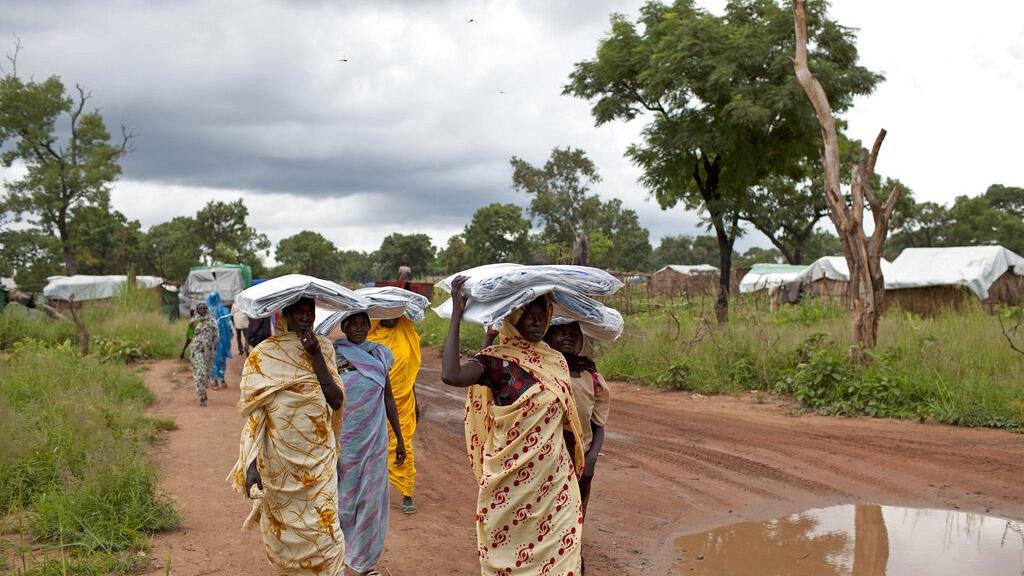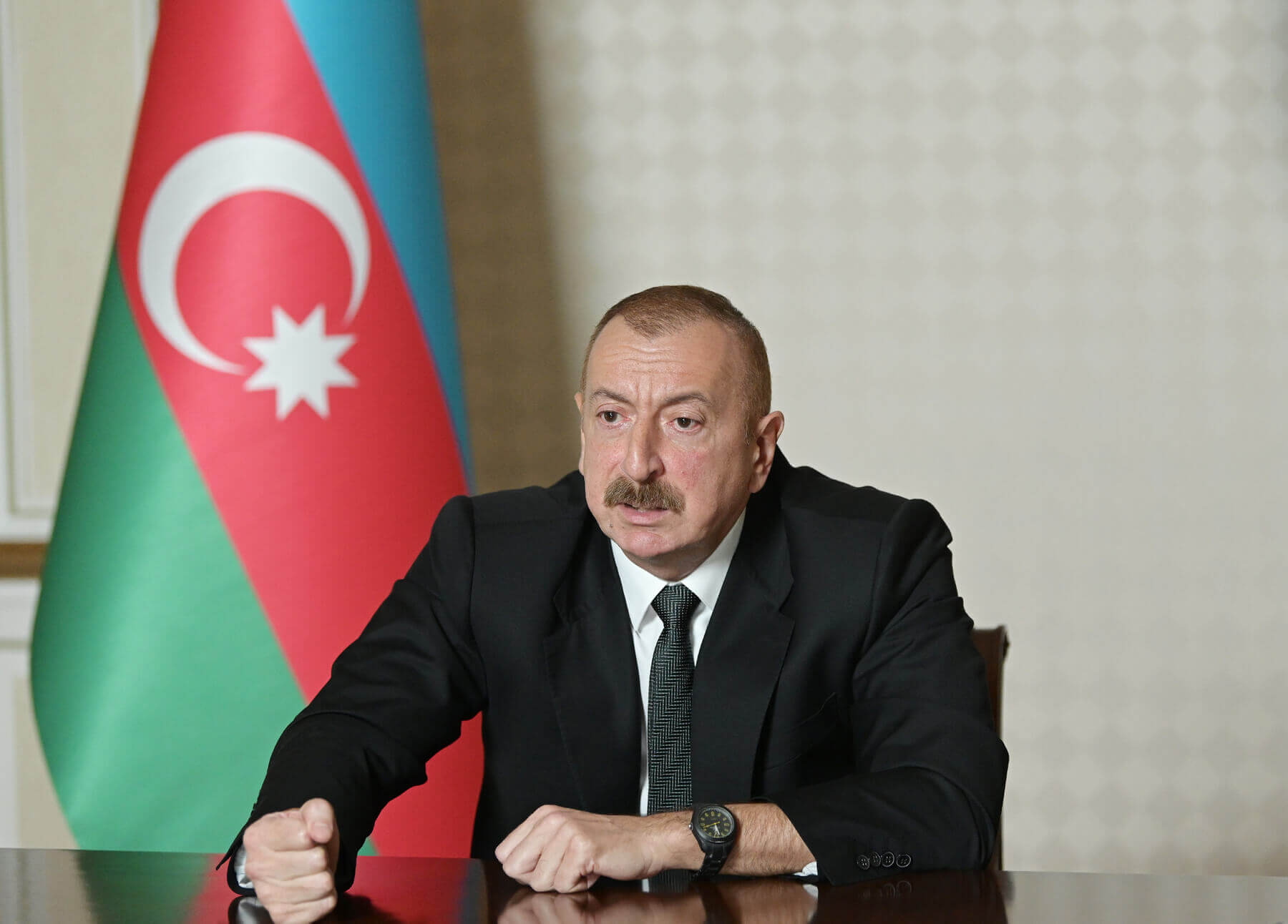South Asia
The Afghan representative to the United Nations, Nasir Ahmad, said the Taliban’s repeated rights violations and “broken promises” were a deep disappointment. He said their actions indicate that any attempts of the international community to negotiate with the group have reached a “dead end.” [Khaama News Press Agency]
Indian Defence Minister Rajnath Singh said Pakistan’s attempts to disrupt peace in Jammu and Kashmir are designed to “bleed India with a thousand cuts.” Addressing security forces in Baramulla, he said Pakistan is orchestrating “anti-India activities” in the region, resulting in a surge in terror activities. [NDTV]
Central Asia and the Caucasus
On Thursday, Azerbaijani President Ilham Aliyev warned Armenia against making territorial claims for Nagorno-Karabakh, saying it is a “useless and dangerous approach.” He added that “if Armenia continues to question the territorial integrity of Azerbaijan, Azerbaijan will have no other choice and will question the territorial integrity of Armenia.” [Anadolu Agency]
A Kyrgyz court on Thursday acquitted former President Almazbek Atambayev in two corruption cases for which he was serving an 11-year sentence in prison. The court did not find the evidence compelling enough to prosecute Almazbek. [RFE/RL]
East and Southeast Asia
Responding to the United States’ criticism of Xi Jinping’s conversation with Russian President Vladimir Putin, Chinese foreign ministry spokesperson Wang Wenbin said Beijing has “always independently assessed the situation on the basis of the historical context and the merits of the issue.” He added that the US is responsible for “pushing” the North Atlantic Treaty Organization eastward and “fuelling conflict.” [Chinese Ministry of Foreign Affairs]
In its first report since Japan announced almost 1.25 million tons of treated radioactive wastewater from the Fukushima Daiichi nuclear plant last April, International Atomic Energy Agency Director-General Rafael Grossi lauded Japan’s “significant progress” in ensuring nuclear safety. The Agency will conduct a second review mission prior to the release of the wastewater next year. [International Atomic Energy Agency]
Europe
The Netherlands’ secret service reported that it had prevented a Russian spy from attacking the International Criminal Court. The individual was attempting to gain access to the war crimes court as a trainee while using the identity of a Brazilian national. [Euronews]
Afghan nationals who previously worked at the British Embassy have reported incidents of torture and abuse by the Taliban. The British government reported that it has evacuated over 15,000 Afghans from the war-torn country since the Taliban’s takeover in August. However, 100 former employees of the British embassy still remain in the country. [BBC]
In an interview with NTV on Thursday, Russian Foreign Minister Sergey Lavrov said attempts are being made to turn Moldova into a “second Ukraine,” which seems to work well for the current Moldovan government’s consumer-oriented approach. “If you don’t do this for us, we’ll move faster into Europe, and if you do, we still will move, but slower. That’s roughly how I read these signals,” Lavrov added, referring it to as “begging.” [TASS]
Latin America and the Caribbean
On Thursday, Cuba’s Deputy Prime Minister, Ricardo Cabrisas, was welcomed by Russian Foreign Minister Sergey Lavrov for his participation at the St. Petersburg International Economic Forum. The two leaders reaffirmed the “excellent state of political relations” between their two countries and agreed to continue deepening economic, trade, financial and cooperation ties. Lavrov reaffirmed Russia’s historic opposition to the United States’ economic blockade on the Caribbean island nation. During his visit, Cabrisas also held talks with Russian presidential advisor Anton Kobyakov and the Minister of Economic Integration and Macroeconomics of the Eurasian Economic Commission Sergey Glaziev. [Prensa Latina]
On Thursday, while expressing concerns over the “unprecedented numbers” of Nicaraguan people fleeing “sociopolitical, economic and human rights crises,” United Nations High Commissioner for Human Rights Michelle Bachelet urged President Daniel Ortega’s government “to uphold its human rights obligations.” She also called on international authorities to “immediately cease policies which are today only serving to isolate the country and its people,” highlighting that there were 16,088 Nicaraguan asylum seekers in March, the highest in the country’s history. [Al Jazeera]

Middle East and North Africa (MENA)
Senior ISIS leader Hani al-Kurdi was detained in a special operation conducted in Aleppo, Syria on Thursday by anti-ISIS coalition forces led by the United States. “The detained individual was assessed to be an experienced bomb maker and facilitator who became one of the group’s top leaders in Syria,” a statement released by the coalition said. It added that there were no civilian or coalition casualties. [Operation Inherent Resolve, OIR]
Saudi Energy Minister Prince Abdulaziz bin Salman said on Thursday that the Kingdom’s relations with Russia are “as warm as the weather in Riyadh.” He made the comments after meeting Russian Deputy Prime Minister Alexander Novak at the St Petersburg International Economic Forum in Russia. [Arab News]
North America
In a meeting with Latvian Foreign Minister Edgars Rinkēvičs on Thursday, United States Deputy Secretary of State Wendy Sherman reaffirmed Washington’s “ironclad commitment to the defence of its Baltic allies.” The pair also talked about cooperating to resolve the global food security crisis caused by Russia’s invasion of Ukraine. [US State Department]
On Thursday, Canadian Natural Resources Minister Jonathan Wilkinson stressed that the strategic mistake made in letting Russia dominate in the oil and gas sectors cannot be repeated in the critical minerals industry. “China and Russia are the number 1 and number 2 producers and processors of many of these minerals. And so I think there is an understanding in the democratic world that we do need to ensure that there are secure and stable sources of supply,” he remarked. Wilkinson also announced that Ottawa has already set aside $4 billion for its critical minerals strategy to be published later this year. [Canada’s National Observer]
Oceania
New Zealand Foreign Minister Nanaia Mahuta hosted her Australian counterpart Penny Wong on Thursday, wherein they expressed their concern at the “growing strategic competition in the Pacific,” referring to increased Chinese engagement in the region. In this regard, they underscored the “importance of consultation of security measures within the region.” [New Zealand Government]
Australian Minister for Trade and Tourism revealed that he held discussions with his counterparts from both India and the European Union, Piyush Goyal and Valdis Dombrovskis, on the sidelines of the 12th World Trade Organization Ministerial Conference in Geneva this week. He expressed his desire to expedite the ratification of the Australia-India Economic Cooperation and Trade Agreement and begin negotiations on a Comprehensive Economic Cooperation Agreement. Similarly, in his meeting with Dombrovskis, he outlined the need to conclude a free trade agreement that would give Australia greater access to a $17 trillion market. [Australian Minister for Trade and Tourism]
Sub-Saharan Africa
The Togolese National Agency for Civil Protection (ANPC) confirmed on Wednesday that 602 refugees from Burkina Faso’s Madjoari have sought refuge in the bordering town of Tône. Southeastern Burkina Faso has seen repeated bouts of violence by Al-Qaeda and Islamic State-linked militias over the last seven years. Aboudou Kerim Nimon, the head of the ANPC has confirmed that the “refugees are all being taken in by host families” and food and financial aid have been distributed to them. The recurring violence has killed 2,000 civilians and soldiers and displaced over two million. Togo’s government on Monday declared a “state of security emergency” to deal with the spillover jihadist attacks. [Africa News]
In a statement released on Thursday, Kenyan President Uhuru Kenyatta said that in his discussions with his Zambian counterpart Hakainde Hichilema, the two leaders sought to eliminate tariff and non-tariff barriers. Hichilema echoed this sentiment, stating that there is a need to lower the cost of doing business and ensure the effective implementation of bilateral agreements. [The Presidency]

